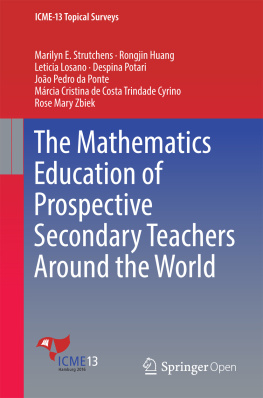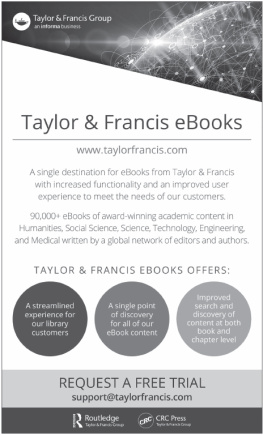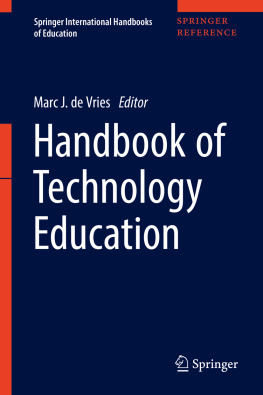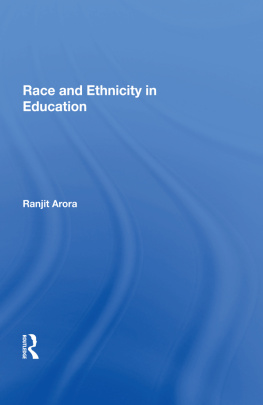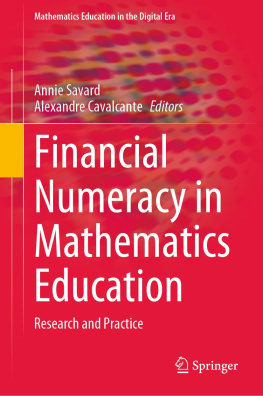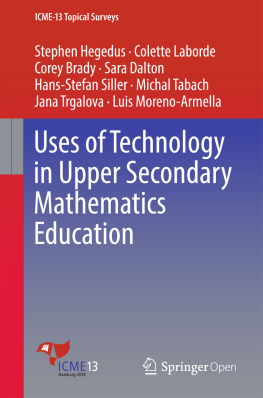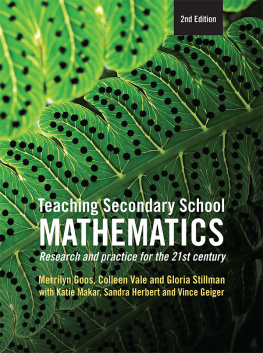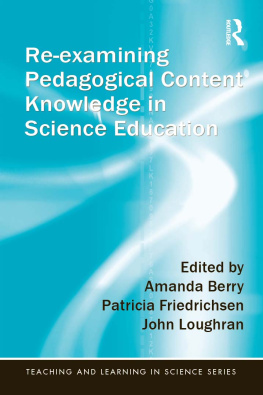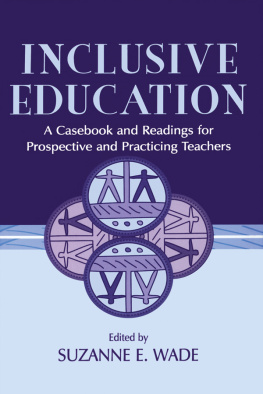The Author(s) 2017
Marilyn E. Strutchens , Rongjin Huang , Leticia Losano , Despina Potari , Mrcia Cristina de Costa Trindade Cyrino , Joo Pedro da Ponte and Rose Mary Zbiek The Mathematics Education of Prospective Secondary Teachers Around the World ICME-13 Topical Surveys 10.1007/978-3-319-38965-3_1
1. Introduction
Marilyn E. Strutchens 1, Leticia Losano 2, Despina Potari 3, Rongjin Huang 4, Joo Pedro da Ponte 5, Mrcia Cristina de Costa Trindade Cyrino 6, Keith R. Leatham 7, Blake E. Peterson 8 and Rose Mary Zbiek 9
(1)
Department of Curriculum and Teaching, Auburn University, Auburn, AL, USA
(2)
Facultad de Matemtica, Universidad Nacional de Crdoba, Crdoba, Crdoba, Argentina
(3)
Mathematics Department Panepistimiouloli, National and Kapodistrian University of Athens, Athens, Greece
(4)
Department of Mathematical Sciences, Middle Tennessee State University, Murfreesboro, TN, USA
(5)
Instituto de Educao, Universidade de Lisboa, Lisbon, Portugal
(6)
Department of Mathematics, State University of Londrina, Londrina, Brazil
(7)
Department of Mathematics Education, Brigham Young University, Provo, UT, USA
(8)
Department of Mathematics Education, Brigham Young University, Provo, UT, USA
(9)
College of Education, The Pennsylvania State University, University Park, PA, USA
The topic study group on the mathematics education of prospective secondary teachers is dedicated to sharing and discussing significant new trends and developments in research and practices related to various aspects of the education of prospective secondary mathematics teachers from an international perspective. As Ponte and Chapman (2016) stated, teacher education is an area in which, although we have developed an understanding about the process of becoming a teacher, many questions still remain open. Our goal in this topic group is to address some of these questions. We discuss major areas in the field, including the nature and structure of teachers knowledge and its development, models and routes of mathematics teacher education, development of professional identities as prospective mathematics teachers, field experiences and their impact on prospective secondary mathematics teachers development of the craft of teaching, and use of various technological devices and resources in preparing prospective secondary mathematics teachers. To facilitate the discussion of these issues, the authors of this survey conducted a systematic literature review of studies published in nine international mathematics education research journals during the last decade focused on the following four areas:
Teacher Knowledge . Addressing the nature of prospective mathematics teacher knowledge, theoretical and methodological perspectives, relationship between teacher knowledge, teaching practice, and students learning as well as the process of prospective teachers knowledge development in teacher education programs.
Technologies , Tools and Resources . Comparing and synthesizing studies on how prospective mathematics teachers develop knowledge that relates technology, pedagogy and content knowledge.
Teachers Professional Identities . Synthesizing research findings on the conceptualization of teacher professional identities, the development of teacher identity through pre-service course work and field experiences.
Field Experiences . Synthesizing and discussing research findings on models; mechanisms; roles of prospective teachers, cooperating teachers, and university supervisors; and field experiences.
More details about the methodology adopted for the review are given in the report of each area.

Open Access This chapter is distributed under the terms of the Creative Commons Attribution-NonCommercial 4.0 International License ( http://creativecommons.org/licenses/by-nc/4.0/ ), which permits any noncommercial use, duplication, adaptation, distribution and reproduction in any medium or format, as long as you give appropriate credit to the original author(s) and the source, provide a link to the Creative Commons license and indicate if changes were made.
The images or other third party material in this chapter are included in the works Creative Commons license, unless indicated otherwise in the credit line; if such material is not included in the works Creative Commons license and the respective action is not permitted by statutory regulation, users will need to obtain permission from the license holder to duplicate, adapt or reproduce the material.
Footnotes
Educational Studies in Mathematics , International Journal of Science and Mathematics Education , Journal for Research in Mathematics Education , Journal of Mathematical Behavior , Journal of Mathematics Teacher Education , Mathematics Education Research Journal , Mathematical Thinking and Learning , Mathematics Teacher Education and Development , and ZDM Mathematics Education (formerly ZDMThe International Journal on Mathematics Education ).
The Author(s) 2017
Marilyn E. Strutchens , Rongjin Huang , Leticia Losano , Despina Potari , Mrcia Cristina de Costa Trindade Cyrino , Joo Pedro da Ponte and Rose Mary Zbiek The Mathematics Education of Prospective Secondary Teachers Around the World ICME-13 Topical Surveys 10.1007/978-3-319-38965-3_2
2. Current Research on Prospective Secondary Mathematics Teachers Knowledge
Despina Potari 1
(1)
Mathematics Department Panepistimiouloli, National and Kapodistrian University of Athens, Athens, Greece
(2)
Instituto de Educao, Universidade de Lisboa, Lisbon, Portugal
Despina Potari (Corresponding author)
Email:
Introduction
Teachers knowledge has been a major focus in the preparation of prospective teachers for a long time. Teachers need to know about the subject that they teach, they need to know how to teach it, and they need to know how to act and behave as teachers. Teacher education institutions organize teacher education programs around three strands, that Winslow and Durand-Guerrier (2007) named as content knowledge, pedagogical knowledge, and didactical knowledge, a distinction based on Shulmans (1986) seminal work that stands as the theoretical basis of a large number of studies in mathematics education. In this chapter, we address research on prospective teacher knowledge in mathematics and didactics of mathematics or knowledge of mathematics teaching.
Ponte and Chapman (2008, 2016) conducted systematic reviews of the research literature from 1998 until 2013 and concluded that some of the important developments in our field are: recognition that mathematical and didactical knowledge required for teaching is of special type; development of ways in teacher education where prospective teachers revisit familiar content in unfamiliar ways to develop the underlying meanings of the mathematics; and understanding the difficulty of prospective teachers to develop knowledge of mathematics teaching and designing tools to promote this knowledge. Although most studies have focused on prospective primary school teachers, there is a recognition that prospective secondary school teachers (PSMTs) knowledge of mathematics and mathematics teaching in secondary schools is of a different nature, and new theoretical and methodological frameworks are needed to study it (Speer et al. 2015). In this chapter, we report findings from our survey on studies related to PSMTs knowledge.

